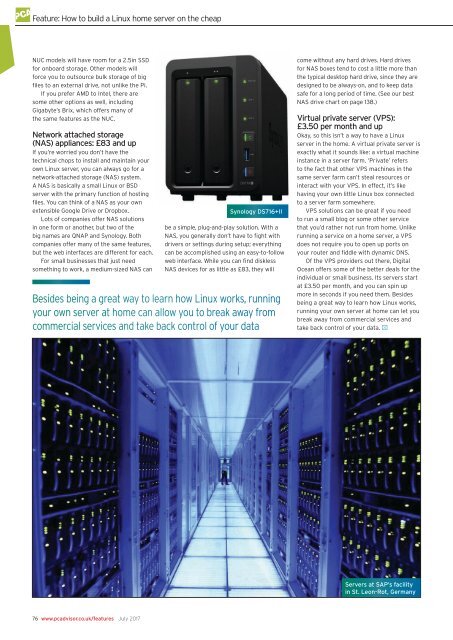Create successful ePaper yourself
Turn your PDF publications into a flip-book with our unique Google optimized e-Paper software.
Feature: How to build a Linux home server on the cheap<br />
NUC models will have room for a 2.5in SSD<br />
for onboard storage. Other models will<br />
force you to outsource bulk storage of big<br />
files to an external drive, not unlike the Pi.<br />
If you prefer AMD to Intel, there are<br />
some other options as well, including<br />
Gigabyte’s Brix, which offers many of<br />
the same features as the NUC.<br />
Network attached storage<br />
(NAS) appliances: £83 and up<br />
If you’re worried you don’t have the<br />
technical chops to install and maintain your<br />
own Linux server, you can always go for a<br />
network-attached storage (NAS) system.<br />
A NAS is basically a small Linux or BSD<br />
server with the primary function of hosting<br />
files. You can think of a NAS as your own<br />
extensible Google Drive or Dropbox.<br />
Lots of companies offer NAS solutions<br />
in one form or another, but two of the<br />
big names are QNAP and Synology. Both<br />
companies offer many of the same features,<br />
but the web interfaces are different for each.<br />
For small businesses that just need<br />
something to work, a medium-sized NAS can<br />
Synology DS716+II<br />
be a simple, plug-and-play solution. With a<br />
NAS, you generally don’t have to fight with<br />
drivers or settings during setup; everything<br />
can be accomplished using an easy-to-follow<br />
web interface. While you can find diskless<br />
NAS devices for as little as £83, they will<br />
Besides being a great way to learn how Linux works, running<br />
your own server at home can allow you to break away from<br />
commercial services and take back control of your data<br />
come without any hard drives. Hard drives<br />
for NAS boxes tend to cost a little more than<br />
the typical desktop hard drive, since they are<br />
designed to be always-on, and to keep data<br />
safe for a long period of time. (See our best<br />
NAS drive chart on page 138.)<br />
Virtual private server (VPS):<br />
£3.50 per month and up<br />
Okay, so this isn’t a way to have a Linux<br />
server in the home. A virtual private server is<br />
exactly what it sounds like: a virtual machine<br />
instance in a server farm. ‘Private’ refers<br />
to the fact that other VPS machines in the<br />
same server farm can’t steal resources or<br />
interact with your VPS. In effect, it’s like<br />
having your own little Linux box connected<br />
to a server farm somewhere.<br />
VPS solutions can be great if you need<br />
to run a small blog or some other service<br />
that you’d rather not run from home. Unlike<br />
running a service on a home server, a VPS<br />
does not require you to open up ports on<br />
your router and fiddle with dynamic DNS.<br />
Of the VPS providers out there, Digital<br />
Ocean offers some of the better deals for the<br />
individual or small business. Its servers start<br />
at £3.50 per month, and you can spin up<br />
more in seconds if you need them. Besides<br />
being a great way to learn how Linux works,<br />
running your own server at home can let you<br />
break away from commercial services and<br />
take back control of your data. J<br />
Servers at SAP’s facility<br />
in St. Leon-Rot, Germany<br />
76 www.pcadvisor.co.uk/features <strong>July</strong> <strong>2017</strong>


















